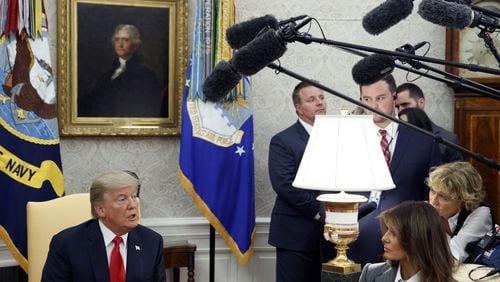Between the time you start and finish reading this column, there’s a good chance that some breaking news has come out of Washington, D.C.
It might be that President Trump has tweeted something, sending the Washington press corps into a frenzy. Or maybe a Democrat in Congress has shot back at him over a tweet.
One of his cabinet members could’ve complained about him. (Inevitably, according to sources who were present at the time but wanted confidentiality.) Or someone leaked part of a legislative proposal or executive order the president plans to release.
Any one of those things, or something like them, cranks up the media machine. Breaking news alerts must be e-mailed. Text alerts light up your smartphone. Facebook posts proliferate.
The cable news networks quickly get expert panels on the air, eagerly analyzing for hours statements often made with 140 characters. (By the way, the sentence you just read was close to the maximum length of a Twitter post. That’s all it takes to generate hours – even days — of coverage.)
Such are the times in which we live.
In this atmosphere, it takes diligence not to ignore the bigger and more critical issues and challenges before our country’s leaders.
Which is what we ask of our journalists at The Atlanta Journal-Constitution, especially Washington correspondent Tamar Hallerman.
She admits it can be hard to stay focused.
“A daily struggle for me, especially since Trump came into office, is reminding myself to avoid the shiny object of the day,” she said. “More often than not that includes the president’s tweets. Occasionally there are moments where I feel like I need to step in and provide some unique perspective or collect reaction from our congressional delegation, but those moments are becoming rarer.”
Showing how decisions in Washington affect our readers guides our work as a newspaper that serves metro Atlantans and Georgians.
We ask our journalists to keep our web sites and newspaper focused on how policy plays out in our state, and on how the lives of our customers will be affected.
“I know my colleagues in the D.C. press corps will be picking apart the president’s tweets,” said Hallerman. “I can instead use my time pursuing stories no one else is writing about that gets back to our mission of local first. It’s invigorating getting to avoid the pack.”
It’s worth noting that Hallerman is the only reporter in Washington who is exclusively focused on Georgia.
And what about back home in Atlanta, where we also feel the influence of President Trump?
“Our coverage has evolved as we’ve grappled over how to best serve our readers in the Trump era,” said Greg Bluestein. “We’ve learned some hard-and-fast lessons. Breathlessly reporting on his latest tweets, his foreign policy decisions, the intrigue over the latest Washington scandal doesn’t set us apart.”
Instead, Bluestein and others venture out into Georgia, talking to regular people and trying to highlight their voices on key issues.
When town halls turned testy across the nation, Bluestein went right to the heart of it — a town hall hosted by a Republican Congressman in Gainesville:
“The seesawing crescendo of boos, cheers, one-liners and comebacks from the crowded pews seemed close to spinning out of control when U.S. Rep. Doug Collins set down his microphone, sat down quietly and asked for a ‘collective deep breath.’”
“He represents the most conservative congressional district in Georgia — Donald Trump carried this North Georgia territory by nearly 80 percent — but the Democrats here are passionate, and they came to Collins’ town hall this week in force to give him an earful.”
Bluestein also journeyed to Homer, Georgia, to catch up with supporters of the president a month after he took office:
“Virtually no other place in Georgia was as supportive of Trump as Banks County, a sparsely populated area where nearly 9 out of every 10 residents voted for the Republican.”
“’If he would just stay off Twitter, we would all be a whole lot better,’ chuckled Bo Garrison, the 60-year-old owner of a deli.”
It’s that kind of reporting that represents what we work hardest to provide to you. And we welcome the enormous responsibility of being the only place you’ll find it.
As part of this effort we’ve launched “Politically Georgia,” a new digital product focused exclusively on Georgia politics. You can find it at www.PoliticallyGeorgia.com
It’s available to you as a subscriber to the AJC, but also available to anyone who cares about how politics and policy impact our state.
Among the stories you can find archived there are pieces by Jeremy Redmon, who covers immigration for the AJC. No issue has been more high-profile and emotional during Trump’s time in office. All he has to do is say or type the word “wall,” and the internet is abuzz for hours.
But the AJC’s Redmon sees a clear focus for his work:
“I believe the current debates over immigrants and refugees are among the most important stories of our generation,” he said. “These are complicated subjects that can seem distant and abstract. So I try to find people in Georgia through whom I can tell my stories, people who can help illuminate what’s at stake for the Atlanta region and this state.”
For example, to write about the debate over the future of the Obama administration’s Deferred Action for Childhood Arrivals program, Redmon focused on Jaime Rangel.
Rangel is a DACA recipient who grew up in North Georgia. A Mexican native who was brought here as an infant, he is a Braves fan and a former Boy Scout with a deep Southern accent. He considers himself politically conservative and appreciates former President Ronald Reagan.
“Our readers probably know many people like him,” said Redmon.
As Washington swirled about the Trump administration’s crackdown on immigration, Redmon instead spent a day riding along with local U.S. Immigration and Customs Enforcement officers. One of them, Bill McCafferty, legally immigrated here from Mexico. While he is sensitive to the plight of immigrants who are here without proper papers, he sees his work as necessary to protect the public.
In a time of constant access to the latest news and controversy, it’s not easy for any of us as citizens to make sense of things.
We hope to help you with that.
So when your phone has spent the day lighting up, and you’ve been catching bits and pieces of the news online at work, and you’ve checked your Facebook feed while waiting at a traffic light, it’s worth taking the time to visit with us online or in print.
We’ll do all we can to make sense of things for you, and let you know what’s really going on.







